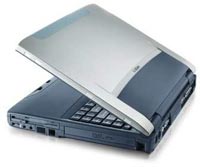 We’ve been asked by Toshiba to hold this story for a couple of days. The site that originally published it, Pocket Lint, had broken the embargo on it.
We’ve been asked by Toshiba to hold this story for a couple of days. The site that originally published it, Pocket Lint, had broken the embargo on it.
Mike Slocombe
UK Public Yet To Embrace Wi-Fi
GX-1S: Samsung Announces Its First Digital SLR
 Way back in October last year we reported that Samsung was cuddling up in bed with Pentax to make Digital SLRs, and the fruit of their digital loins has been announced today, the Samsung GX-1S.
Way back in October last year we reported that Samsung was cuddling up in bed with Pentax to make Digital SLRs, and the fruit of their digital loins has been announced today, the Samsung GX-1S.Photographers hoping for a cutting edge, innovatory collaboration will be disappointed as the GX-1S is simply a rebadged Pentax *ist DS2, with a few new Schneider lenses lobbed in (although they appear to be smple re-badge/tweaked jobs too).
 Still, it’s a very capable camera, offering a 6 megapixel sensor, 2.5-inch screen (210K pixels), expansive ISO range from 200 to 3200, a host of shooting modes and a Pentax AF lens mount.
Still, it’s a very capable camera, offering a 6 megapixel sensor, 2.5-inch screen (210K pixels), expansive ISO range from 200 to 3200, a host of shooting modes and a Pentax AF lens mount.The camera’s compact and lightweight (505 grams) design should make it tempting to travellers, with the Schneider Kreuznach D-Xenon lens system offers compatibility with Pentax’s extensive catalogue of KAF bayonet mount lens.
 Although some may not see the point in Samsung announcing what amounts to an already released product under a different name, there are clear benefits for both companies.
Although some may not see the point in Samsung announcing what amounts to an already released product under a different name, there are clear benefits for both companies.Pentax need to sell the *ist DS2 in greater volumes and what better way to do that than get the globe-spanning corporate might of Samsung onboard?
 With more units shifted, Pentax benefit from lower production costs, increased sales and a greatly increased user base for their lenses and their system, thus ensuring the future of its system.
With more units shifted, Pentax benefit from lower production costs, increased sales and a greatly increased user base for their lenses and their system, thus ensuring the future of its system.For Samsung, the benefits are equally clear cut, as they get to make an immediate mark on the burgeoning dSLR market by releasing a capable, well-reviewed camera while working on new joint designs with Pentax.
 Then there’s the awesome might of Samsung’s marketing budget to consider, with some suspecting that the new camera will be sold as a “loss leader” to help establish the brand.
Then there’s the awesome might of Samsung’s marketing budget to consider, with some suspecting that the new camera will be sold as a “loss leader” to help establish the brand.All this fits in with Samsung’s stated aim to become a world class digital camera manufacturer, with its growing ambitions reflected in the recent release of their high-end, prosumer Pro815 digicam.
SPECIFICATIONS:
Sensor: 23.5mm x 15.7mm CCD, 6.3 million pixels
Image sizes: 3008 x 2000, 2400 x 1600, 1536 x 1024
File formats: RAW (12-bit), JPEG (EXIF 2.21) – 3 levels
Lenses: Schneider D-XENON, Pentax KAF2, KAF, KA mount lenses
Power zoom not available
K mount lenses available with (function limited)
S mount lenses available with adapter (function limited)
67/645 lenses available with adapter (function limited)
Focus: 11-area AF, TTL Phase matching AF system, Focus point selectable
Focus modes: AF-Single, AF-Continuous (Action mode), Manual focus
Shooting modes: AUTO Scene, Portrait, Flash off, Program AE, Shutter Priority AE, Aperture Priority AE, Manual, Bulb
Scene (SCN) modes: Normal, Portrait, Landscape, Macro, Moving Object, Night scene
Metering: 16-segment, Center-Weighted Average, Spot
ISO sensitivity: Auto, ISO 200-3200
Shuttter speed: 30 to 1/4000 sec, Bulb
Shutter x-sync 1/180 sec
Flash: • Built-in P-TTL pop-up flash, Guide number 15.6 (ISO 200/m), Flash sync 1/180 sec
Power: 4 x AA batteries or 2 x CR-V3
Weight: (no batt/lens) 505 g (1.1 lb), (no lens) 605 g (1.3 lb)
Dimensions 125 x 93 x 66 mm (4.9 x 3.6 x 2.6 in)TAVI 20GB Portable Media Player, The ‘World’s Smallest PMP’ On Sale
 It might look like a run-of-the-mill Gameboy Advance SP, but the TAVI Portable Media Player packs a much mightier multimedia punch, with the wee fella letting you watch movies, playback music, look at your photos, listen to FM radio, read eBooks and record your own voice.
It might look like a run-of-the-mill Gameboy Advance SP, but the TAVI Portable Media Player packs a much mightier multimedia punch, with the wee fella letting you watch movies, playback music, look at your photos, listen to FM radio, read eBooks and record your own voice.Weighing just 8.9 ounces and measuring a pocket-pleasing 3.6″ x 3.2″ x 0.97″, the TAVI manages to pack a 320×240 pixel 16.7 million colour LCD display, USB 2.0 support and a hefty 20GB hard drive into its diminutive clamshell design
Video support comes in the shape of Divx 3.11/4/5, XviD, and MPEG1/2/4 format, playable up to 720×560 pixels at 30fps at an impressive 8Mbps bitrate, with JPEG and BMP photo formats supported.
 Audio support is pretty generous too, with the unit offering MP3, WMA, OGG, AC3 and AAC playback.
Audio support is pretty generous too, with the unit offering MP3, WMA, OGG, AC3 and AAC playback.There’s a pair of ‘virtual 3D surround stereo speakers’ built in, although the tiny size of the things suggest that bass is going to be very thin on the ground.
Battery life is claimed at a respectable 10 hours for audio and 5 hours for video playback – long enough for two ordinary movies or maybe half of an Eastern European arthouse film.
 There’s also a built in FM radio and mic, line-in recording (audio only) and TXT reader support.
There’s also a built in FM radio and mic, line-in recording (audio only) and TXT reader support.TAVI claims that the unit can be connected to a home theatre system and provide 1080i Hi-Def quality video output with digital 5.1 surround sound, “without the slightest compromise in clarity” – an impressive achievement indeed.
If you’re in the US, the TAVI 20 GB Portable Multimedia Center have just landed on WalMart’s expansive shelves with a retail price of $499.73 (~£280, ~€410), which seems something of a bargain – if the player delivers on its promises, of course.
 SPECIFICATIONS
SPECIFICATIONSVIDEO
LCD Display: 3.5-inch TFT LCD, 320 X 240 pixels, 16.7 Million Colors
File Formats: up to 720×480 pixels, 30 f/s, 8Mbps Bitrate
Divx 3.11 / 4 / 5, XviD, MPEG1 (VCD), MPEG2 (DVD),MPEG4 (WMV and ASF: transcoding software)
Bookmark / Resume Function / Video SubtitlesAUDIO
File Formats: MP3, WMA, Ogg Vorbis, AC3, AAC
Audio Out: Stereo, Optical 5.1 Channel Surround SoundVOICE RECODER
Recording (Direct Encoding: MP3 (via 64 / 128kbps Bitrate)
Recording Source: Voice (Built-in Mic.), FM Radio (Direct), Line-in (External Mic.)FM RADIO
FM Frequency Range: 76Mhz-108Mhz (Global / International FM Ready) PHOTOS & eBOOKS
PHOTOS & eBOOKS
File Formats: JPG, BMP, Text, etc
Preview / Slideshow / Image Rotation / Meta Info DisplayADDITIONAL FEATURES
Alarm Clock
Custom Background Image
Background Music: Play Music with Photos, eBooks and more
File Management: Move / Copy / Delete / Rename / Create files and folders
USB 2.0 high speed and USB 1.1 Host3D SOUND
Built-in Stereo Speakers with Virtual 3D Sound
EQ: 27 Preset Modes (Including Virtual 3D Sound) Plus Custom Settings
External Video Output
PAL & NTSC
Composite Video / Component Video (480p, 720p, 1080i), S-Video /w cradleSmart Power Technology
Smart Brightness: Automatic LCD brightness with a sensor
Sleep timer control, Automatic system off, Automatic LCD off,
Intelligent HDD sleep mode POWER
POWER
Built-in Rechargeable Lithium Ion Battery
Playback Time:
– Music up to 10 hours ( LCD off, 128kbps mp3 Play, Earphone out)
– Video Up to 6 hours ( 320 X 240, 30frame)Charge time:
– Quick: about 3.5 hours (charges up to 80% of battery capacity)
– Full: about 4.5 hoursAdapter:
– AC in: 100V to 240V
– DC out: 5V, 2ASYSTEM REQUIREMENTS
Microsoft Windows XP / 2000 / ME / 98SE, Mac OS, LinuxCasio S600 Digital Camera Gets European Release
 Casio have announced the European release of their super-slim 6 megapixel camera featuring an ‘Anti Shake’ DSP and MPEG-4 movie recording.
Casio have announced the European release of their super-slim 6 megapixel camera featuring an ‘Anti Shake’ DSP and MPEG-4 movie recording.Thinner than a supermodel on a crash diet (just 16.1 mm thick), the S600 comes with a retracting 3x optical zoom, superfast shutter release (0.007 second) and high-speed picture playback of approx 0.1 seconds interval.
Casio is making a big noise about the EX-S600’s ability to reduce camera shake when recording quality MPEG-4 movies through its EXILIM engine’s Anti Shake DSP (digital signal processor).
 As the name suggests, its not a proper mechanical anti-shake gizmo – instead, the camera employs high ISO1600 sensitivity plus a faster shutter speed to minimize image blur.
As the name suggests, its not a proper mechanical anti-shake gizmo – instead, the camera employs high ISO1600 sensitivity plus a faster shutter speed to minimize image blur.The camera can record MPEG-4, VGA (640×480 pixels) video at 30 frames/second, with a ‘normal’ mode, letting users capture up to one hour of movies on a 1GB SD memory card.
Point’n’shooters will like the “Quick Shutter” function which provides simple and easy high-speed focusing, with 34 different “BESTSHOT” settings taking care of scene settings.
 An improved battery allows up to 300 shots per battery charge, with the 2.2 inch LCD being “twice as bright” as previous models.
An improved battery allows up to 300 shots per battery charge, with the 2.2 inch LCD being “twice as bright” as previous models.For charging up the camera, transferring images or connecting to a TV, the EX-S600 is plonked on its supplied multi cradle.
The cameras are available in a range of colours which the designers insist should be known as “Sparkle Silver”, “Mistral Blue” and “Latin Orange.”
 It’s taken some considerable time for the Casio S600 to reach Europe – it’s been available in Japan since October 2005 – but you should be able to pick it on the High Street for around £230 (~€335, ~$406).
It’s taken some considerable time for the Casio S600 to reach Europe – it’s been available in Japan since October 2005 – but you should be able to pick it on the High Street for around £230 (~€335, ~$406).Curitel DMB PT-S160 MobileTV Phone Released
 In a feast of digital convergence, Pantech & Curitel have announced the launch of their new multimedia-tastic PT-S160 phone.
In a feast of digital convergence, Pantech & Curitel have announced the launch of their new multimedia-tastic PT-S160 phone.We’re not sure of all the details (we’re helplessly fumbling around deep in foreign translations here), but the beefy-sized phone looks to be a good example of where digital convergence might be taking us.
With the technology letting mobile users watch terrestrial DMB TV and simultaneously natter away on their phones, Digital multimedia broadcasting could be one of the soarway hits of 2006.
 The PT-S160 doubles up as a PMP (Portable Multimedia Player) and a satellite DMB receiver, with a sliding design only showing keys for DMB functions when closed.
The PT-S160 doubles up as a PMP (Portable Multimedia Player) and a satellite DMB receiver, with a sliding design only showing keys for DMB functions when closed.Lurking underneath is the slide out keyboard with all the necessary keys for making calls.
The unit comes with stereo ‘3D live sound ‘speakers on the front side of the body with TV pictures viewed on a 2.4 inch 260k QVGA LCD (320×240) screen.
 The screen can be switched between landscape and portrait formats.
The screen can be switched between landscape and portrait formats.Also onboard is an MP3 player, a 2 megapixel auto focus camera, T-flash memory slot and TV Out.
With the unit measuring 52.4x 107.5x 22.5 mm and weighing 139g, it’s a bit of a pocket bulger, but still pretty amazingly small considering the technology you’re getting.
 The makers claim a talk time of 300 minutes and a hefty standby time of 300 hours (although we’ve no idea how long you’ll get when watching TV).
The makers claim a talk time of 300 minutes and a hefty standby time of 300 hours (although we’ve no idea how long you’ll get when watching TV).As ever, there’s no detail of when this product may be available in the UK, but we can dream.
Nokia 6125 Clamshell Offers Bluetooth 2.0 with Enhanced Data Rate
 Nokia has shunted out a new addition to their mid-range mobile portfolio with the new Nokia 6125 clamshell phone, offering stereo audio streaming over Bluetooth and FM Radio.
Nokia has shunted out a new addition to their mid-range mobile portfolio with the new Nokia 6125 clamshell phone, offering stereo audio streaming over Bluetooth and FM Radio.Measuring 9 x 4.6 x 2.4cm and weighing 98g, the Nokia features a 1.8in, 128 x 160 pixel, 262k main colour screen with a secondary 1.4in, 96 x 65 pixel, 65k colour external screen.
The Nokia 6125 comes with the usual bag of multimedia widgets, including a built in music player, video recording and Bluetooth 2.0 support with EDR for improved data transfer speeds and signal quality for stereo audio streaming.
The phone features a built-in 1.3 megapixel camera offering 8x digital zoom, video recording, a dedicated camera button and hot-swappable microSD memory card.
As well as Bluetooth, there’s infrared and USB connectivity, with MMS, instant messaging, push to talk and Nokia Xpress audio messaging to keep y’all in touch.
 The quadband Nokia 6125 operates in GSM 850/900/1800/1900 networks and provides a flight mode, which enables the user to work with calendar or listen to music while on the flight – although we’ve heard of airlines like Virgin insisting that you turn off all phones – including those with ‘flight modes.’
The quadband Nokia 6125 operates in GSM 850/900/1800/1900 networks and provides a flight mode, which enables the user to work with calendar or listen to music while on the flight – although we’ve heard of airlines like Virgin insisting that you turn off all phones – including those with ‘flight modes.’The music player supports a wide variety of music formats including MP3, MP4, eAAC+ and WMA, and comes with a stereo FM radio, Visual Radio and video ring tones.
The battery is an 820mAh jobbie which Nokia claims will serve up between 2-5 hours’ talk time and 160-280 hours’ on standby.
The Nokia 6125 is expected to ship in the second quarter of 2006, retailing for around €230 (~£157, ~$280)
JVC Everio GZ-MG77 Camcorder Unveiled
 JVC has unveiled the flagship model to its extensive range of Everio hard drive camcorders, the GZ-MG77.
JVC has unveiled the flagship model to its extensive range of Everio hard drive camcorders, the GZ-MG77.Updating last year’s Everio GZ-MG70, the GZ-MG77 features a 10x optical zoom, fast F2.1 lens coupled with a flip-out 2.7-inch LCD viewfinder.
Going head to head with Sony’s recently unveiled Handycam DCR-S100 and Sanyo’s Xacti HD1, the GZ-MG77 serves up a hefty 30 GB of storage, with four different recording modes offering between 7 and 37 hours of video (approx).
 In the highest resolution mode, Ultra Fine, users can record 7 hours and 10 minutes of video at 9 Mbps.
In the highest resolution mode, Ultra Fine, users can record 7 hours and 10 minutes of video at 9 Mbps.This increases to 10 hours and 40 minutes at 6 Mbps (‘Fine’ mode), 14 hours and 10 minutes at 4.5 Mbps (‘Normal’) and a massive, holiday-spanning 37 hours and 30 minutes at 1.7 Mbps (‘Economy’).
The two high quality modes record at 720 x 480 pixels, with Normal and Economy being recorded at a lower 352 x 240 pixels resolution.
 Video can be recorded in both standard and widescreen aspect formats, with an option to record stills.
Video can be recorded in both standard and widescreen aspect formats, with an option to record stills.The GZ-MG77 sports a 1/3.9-inch CCD sensor and auto flash, and comes with JVC’s Low Light Plus and 3D Noise Reduction technologies, which claims to reduce video noise by approximately 30%.
There’s also support for PictBridge direct-to-printer output, USB 2.0 connectivity, SD Card slot and built-in DVD burner control for direct connection to an optional JVC DVD burner.
The camcorder is expected to hit the streets in March 2006, with pricing to be announced later.
Traffic Vizzion Streams Traffic Cameras To Smartphones
 US firm Vizzion have announced the introduction of their innovative traffic-watching system “Traffic Vizzion” to eleven areas in the UK.
US firm Vizzion have announced the introduction of their innovative traffic-watching system “Traffic Vizzion” to eleven areas in the UK.The system streams roadside and traffic camera videos to smartphones, letting drivers check the route ahead for congestion or other problems.
Users can browse cameras by region, and those with a Bluetooth enabled cell phone and GPS can use the “Watch Road Ahead” feature in Traffic Vizzion to monitor cameras directly ahead.
The display continuously updates to show the next camera up ahead, with no button presses or scrolling required.
 GPS users can also call up a “Find Nearby Cameras” function to list cameras close to their current location, and then select and view any camera from the list in the hope of finding the best way out of a jam.
GPS users can also call up a “Find Nearby Cameras” function to list cameras close to their current location, and then select and view any camera from the list in the hope of finding the best way out of a jam.Insisting that Vizzion is in fact pronounced ‘vision’, the company’s cheap’n’cheerful Website lists the 11 locations across the UK where the system will initially be available:
Berkshire: Reading area
Glamorgan: Cardiff, Swansea areas
Greater London: 9 London areas
Hampshire: Southampton, Winchester areas
Lanarkshire: Glasgow area
Midlothian: Edinburgh area
Monmouthshire: Newport area
Nottinghamshire: Nottingham area
South Yorkshire: Sheffield area Traffic Vizzion runs on Windows Mobile 2003 for Smartphones, and relies on a working Internet connection (e.g. GPRS), with a Bluetooth GPS device required for the added features.
Traffic Vizzion runs on Windows Mobile 2003 for Smartphones, and relies on a working Internet connection (e.g. GPRS), with a Bluetooth GPS device required for the added features.There’s a free two week trial available from their website, with the regular subscription costing $5 (£3) per month, billable to MasterCard or Visa.
Naturally, you’d also have to add on any data transfer fees from your network provider.
Sony VN-CX1: Skype Mouse Phone
 No idea if we’re ever going to see it turning up in Blighty any time soon, but we love this crazy new Sony VN-CX1 USB optical mouse-phone.
No idea if we’re ever going to see it turning up in Blighty any time soon, but we love this crazy new Sony VN-CX1 USB optical mouse-phone.The press release is only in Japanese, but we worked out that mouse-phone (‘phouse’?, moune?) is able to notify you of incoming calls via flashing LED and built-in speaker.
When closed, the mouse works like any other with the dial in the middle functioning as a scroll wheel.
 The clever stuff happens when a call comes in.
The clever stuff happens when a call comes in.The user can then flip open the mouse to reveal a functional phone, with the mouse-wheel being used to adjust the volume. Pressing the scroll wheel mutes the call.
The built in echo cancellation feature should guarantee decent call sound quality, and finishing the call is as simple as flipping the mouse-phone shut.
 A potential problem might arise if you wanted to use the mouse when you’re on a call, but we think you can just switch to speakerphone mode. Or maybe not (the translated press announcement goes on about ‘knitting machines’ so it’s a bit vague).
A potential problem might arise if you wanted to use the mouse when you’re on a call, but we think you can just switch to speakerphone mode. Or maybe not (the translated press announcement goes on about ‘knitting machines’ so it’s a bit vague).Being a Sony product, the Sony VN-CX1 looks to please groovy feckers, offering the mouse in 5 trendy colours to match their shade of laptop/shirt/nail varnish.
 Although the VN-CX1 doesn’t look like the most comfortable mouse we’ve ever seen, it’s small and light enough (45.5 × 23.9 × 89.2 mm, 67gms) and certainly looks a fun product.
Although the VN-CX1 doesn’t look like the most comfortable mouse we’ve ever seen, it’s small and light enough (45.5 × 23.9 × 89.2 mm, 67gms) and certainly looks a fun product.Pricing and availability is to be announced.
D-Link Unveil Skype USB Phone Adapter
 D-Link’s new Skype USB phone adapter (DPH-50U) is a neat widget that lets users make and receive Skype calls on their existing corded DECT or cordless phone, without the need to have a pesky ‘call centre’ headset stuck on their head.
D-Link’s new Skype USB phone adapter (DPH-50U) is a neat widget that lets users make and receive Skype calls on their existing corded DECT or cordless phone, without the need to have a pesky ‘call centre’ headset stuck on their head.The DPH-50U lets users take both Skype and regular telephone calls from the same phone with the ability to switch from a Skype call to a landline call (and vice versa) like a conventional call waiting service.
A display on the unit flashes up whether the incoming call is from a Skype or landline connection, and it’s also possible to take part in conference calls between regular telephone and Skype lines.
 The concept seems a winner to us – by using your existing telephone you should enjoy better sound quality than a cheapo headset, and D-Link claim that you’ll be able to use your phone’s built-in features such as speed dial, redial, mute and caller ID2 for both Skype and landline calls.
The concept seems a winner to us – by using your existing telephone you should enjoy better sound quality than a cheapo headset, and D-Link claim that you’ll be able to use your phone’s built-in features such as speed dial, redial, mute and caller ID2 for both Skype and landline calls.Best of all, if you own a cordless phone, you’ll be able to wander about your gaff while chatting away for free.
“At D-Link, we know that the digital home is all about integration and ease-of-use,” said Keith Karlsen, executive vice president, D-Link. “By extending Skype to be accessible through traditional phones, we can make the benefits of Skype even easier to experience.”
 The DPH-50U comes with custom software, two RJ-11 ports and a USB port to connect up the regular phone line, telephone and computer, with the unit drawing power from the computer’s PC port.
The DPH-50U comes with custom software, two RJ-11 ports and a USB port to connect up the regular phone line, telephone and computer, with the unit drawing power from the computer’s PC port.The phone adaptor will be available in Europe from February 2006 for around forty quid (~$70 ~e58). I think we’ll be buying one.
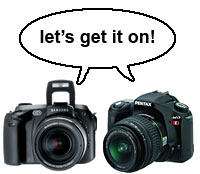 Way back in October last year we reported that Samsung was
Way back in October last year we reported that Samsung was 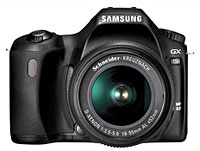 Still, it’s a very capable camera, offering a 6 megapixel sensor, 2.5-inch screen (210K pixels), expansive ISO range from 200 to 3200, a host of shooting modes and a Pentax AF lens mount.
Still, it’s a very capable camera, offering a 6 megapixel sensor, 2.5-inch screen (210K pixels), expansive ISO range from 200 to 3200, a host of shooting modes and a Pentax AF lens mount.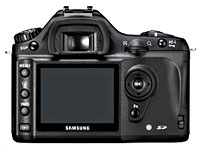 Although some may not see the point in Samsung announcing what amounts to an already released product under a different name, there are clear benefits for both companies.
Although some may not see the point in Samsung announcing what amounts to an already released product under a different name, there are clear benefits for both companies.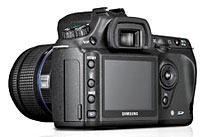 With more units shifted, Pentax benefit from lower production costs, increased sales and a greatly increased user base for their lenses and their system, thus ensuring the future of its system.
With more units shifted, Pentax benefit from lower production costs, increased sales and a greatly increased user base for their lenses and their system, thus ensuring the future of its system.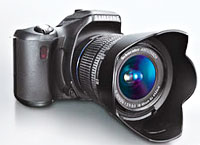 Then there’s the awesome might of Samsung’s marketing budget to consider, with some suspecting that the new camera will be sold as a “loss leader” to help establish the brand.
Then there’s the awesome might of Samsung’s marketing budget to consider, with some suspecting that the new camera will be sold as a “loss leader” to help establish the brand.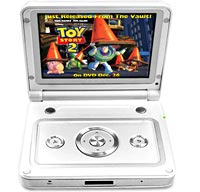 It might look like a run-of-the-mill Gameboy Advance SP, but the TAVI Portable Media Player packs a much mightier multimedia punch, with the wee fella letting you watch movies, playback music, look at your photos, listen to FM radio, read eBooks and record your own voice.
It might look like a run-of-the-mill Gameboy Advance SP, but the TAVI Portable Media Player packs a much mightier multimedia punch, with the wee fella letting you watch movies, playback music, look at your photos, listen to FM radio, read eBooks and record your own voice. Audio support is pretty generous too, with the unit offering MP3, WMA, OGG, AC3 and AAC playback.
Audio support is pretty generous too, with the unit offering MP3, WMA, OGG, AC3 and AAC playback.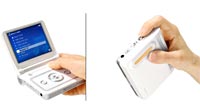 There’s also a built in FM radio and mic, line-in recording (audio only) and TXT reader support.
There’s also a built in FM radio and mic, line-in recording (audio only) and TXT reader support.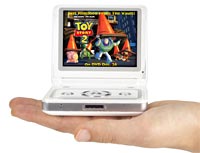 SPECIFICATIONS
SPECIFICATIONS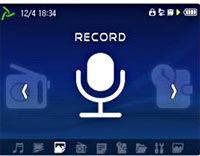 PHOTOS & eBOOKS
PHOTOS & eBOOKS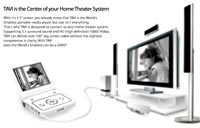 POWER
POWER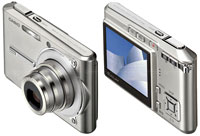 Casio have announced the European release of their super-slim 6 megapixel camera featuring an ‘Anti Shake’ DSP and MPEG-4 movie recording.
Casio have announced the European release of their super-slim 6 megapixel camera featuring an ‘Anti Shake’ DSP and MPEG-4 movie recording.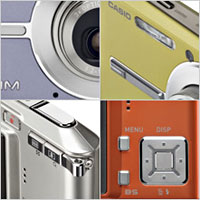 As the name suggests, its not a proper mechanical anti-shake gizmo – instead, the camera employs high ISO1600 sensitivity plus a faster shutter speed to minimize image blur.
As the name suggests, its not a proper mechanical anti-shake gizmo – instead, the camera employs high ISO1600 sensitivity plus a faster shutter speed to minimize image blur.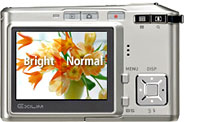 An improved battery allows up to 300 shots per battery charge, with the 2.2 inch LCD being “twice as bright” as previous models.
An improved battery allows up to 300 shots per battery charge, with the 2.2 inch LCD being “twice as bright” as previous models.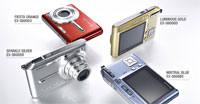 It’s taken some considerable time for the Casio S600 to reach Europe – it’s been available in Japan since October 2005 – but you should be able to pick it on the High Street for around £230 (~€335, ~$406).
It’s taken some considerable time for the Casio S600 to reach Europe – it’s been available in Japan since October 2005 – but you should be able to pick it on the High Street for around £230 (~€335, ~$406). In a feast of digital convergence, Pantech & Curitel have announced the launch of their new multimedia-tastic PT-S160 phone.
In a feast of digital convergence, Pantech & Curitel have announced the launch of their new multimedia-tastic PT-S160 phone.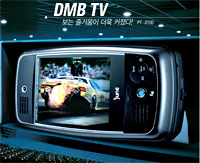 The PT-S160 doubles up as a PMP (Portable Multimedia Player) and a satellite DMB receiver, with a sliding design only showing keys for DMB functions when closed.
The PT-S160 doubles up as a PMP (Portable Multimedia Player) and a satellite DMB receiver, with a sliding design only showing keys for DMB functions when closed.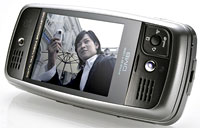 The screen can be switched between landscape and portrait formats.
The screen can be switched between landscape and portrait formats.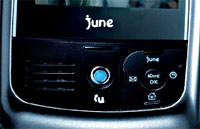 The makers claim a talk time of 300 minutes and a hefty standby time of 300 hours (although we’ve no idea how long you’ll get when watching TV).
The makers claim a talk time of 300 minutes and a hefty standby time of 300 hours (although we’ve no idea how long you’ll get when watching TV).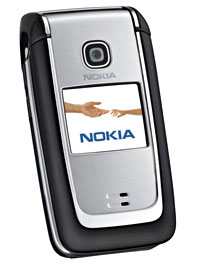 Nokia has shunted out a new addition to their mid-range mobile portfolio with the new Nokia 6125 clamshell phone, offering stereo audio streaming over Bluetooth and FM Radio.
Nokia has shunted out a new addition to their mid-range mobile portfolio with the new Nokia 6125 clamshell phone, offering stereo audio streaming over Bluetooth and FM Radio.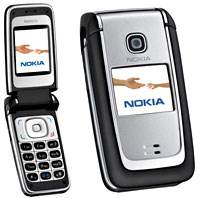 The quadband Nokia 6125 operates in GSM 850/900/1800/1900 networks and provides a flight mode, which enables the user to work with calendar or listen to music while on the flight – although we’ve heard of airlines like Virgin insisting that you turn off all phones – including those with ‘flight modes.’
The quadband Nokia 6125 operates in GSM 850/900/1800/1900 networks and provides a flight mode, which enables the user to work with calendar or listen to music while on the flight – although we’ve heard of airlines like Virgin insisting that you turn off all phones – including those with ‘flight modes.’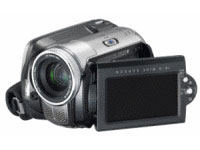 JVC has unveiled the flagship model to its extensive range of Everio hard drive camcorders, the GZ-MG77.
JVC has unveiled the flagship model to its extensive range of Everio hard drive camcorders, the GZ-MG77.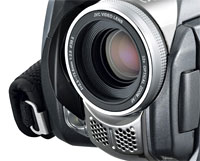 In the highest resolution mode, Ultra Fine, users can record 7 hours and 10 minutes of video at 9 Mbps.
In the highest resolution mode, Ultra Fine, users can record 7 hours and 10 minutes of video at 9 Mbps.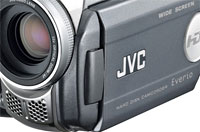 Video can be recorded in both standard and widescreen aspect formats, with an option to record stills.
Video can be recorded in both standard and widescreen aspect formats, with an option to record stills.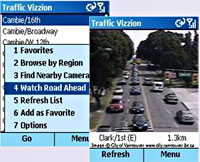 US firm Vizzion have announced the introduction of their innovative traffic-watching system “Traffic Vizzion” to eleven areas in the UK.
US firm Vizzion have announced the introduction of their innovative traffic-watching system “Traffic Vizzion” to eleven areas in the UK.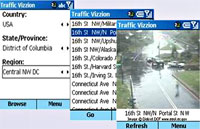 GPS users can also call up a “Find Nearby Cameras” function to list cameras close to their current location, and then select and view any camera from the list in the hope of finding the best way out of a jam.
GPS users can also call up a “Find Nearby Cameras” function to list cameras close to their current location, and then select and view any camera from the list in the hope of finding the best way out of a jam. Traffic Vizzion runs on Windows Mobile 2003 for Smartphones, and relies on a working Internet connection (e.g. GPRS), with a Bluetooth GPS device required for the added features.
Traffic Vizzion runs on Windows Mobile 2003 for Smartphones, and relies on a working Internet connection (e.g. GPRS), with a Bluetooth GPS device required for the added features.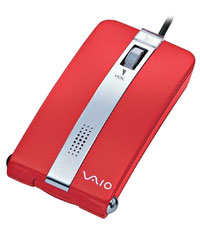 No idea if we’re ever going to see it turning up in Blighty any time soon, but we love this crazy new Sony VN-CX1 USB optical mouse-phone.
No idea if we’re ever going to see it turning up in Blighty any time soon, but we love this crazy new Sony VN-CX1 USB optical mouse-phone.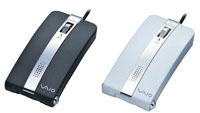 The clever stuff happens when a call comes in.
The clever stuff happens when a call comes in.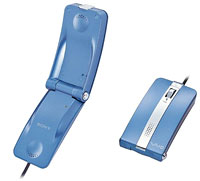 A potential problem might arise if you wanted to use the mouse when you’re on a call, but we think you can just switch to speakerphone mode. Or maybe not (the translated press announcement goes on about ‘knitting machines’ so it’s a bit vague).
A potential problem might arise if you wanted to use the mouse when you’re on a call, but we think you can just switch to speakerphone mode. Or maybe not (the translated press announcement goes on about ‘knitting machines’ so it’s a bit vague).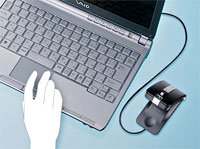 Although the VN-CX1 doesn’t look like the most comfortable mouse we’ve ever seen, it’s small and light enough (45.5 × 23.9 × 89.2 mm, 67gms) and certainly looks a fun product.
Although the VN-CX1 doesn’t look like the most comfortable mouse we’ve ever seen, it’s small and light enough (45.5 × 23.9 × 89.2 mm, 67gms) and certainly looks a fun product.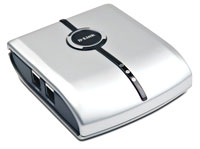 D-Link’s new Skype USB phone adapter (DPH-50U) is a neat widget that lets users make and receive Skype calls on their existing corded DECT or cordless phone, without the need to have a pesky ‘call centre’ headset stuck on their head.
D-Link’s new Skype USB phone adapter (DPH-50U) is a neat widget that lets users make and receive Skype calls on their existing corded DECT or cordless phone, without the need to have a pesky ‘call centre’ headset stuck on their head. The concept seems a winner to us – by using your existing telephone you should enjoy better sound quality than a cheapo headset, and D-Link claim that you’ll be able to use your phone’s built-in features such as speed dial, redial, mute and caller ID2 for both Skype and landline calls.
The concept seems a winner to us – by using your existing telephone you should enjoy better sound quality than a cheapo headset, and D-Link claim that you’ll be able to use your phone’s built-in features such as speed dial, redial, mute and caller ID2 for both Skype and landline calls.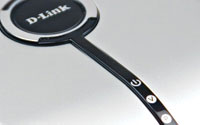 The DPH-50U comes with custom software, two RJ-11 ports and a USB port to connect up the regular phone line, telephone and computer, with the unit drawing power from the computer’s PC port.
The DPH-50U comes with custom software, two RJ-11 ports and a USB port to connect up the regular phone line, telephone and computer, with the unit drawing power from the computer’s PC port.